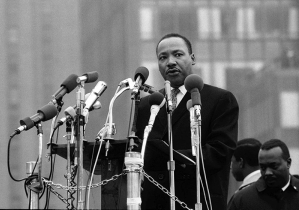
Yesterday would have been the 86th birthday Dr. Martin Luther King Jr. if he was not assassinated by a racist back in the 1960s. However, while Americans will take time to remember his legacy on race relations this upcoming Monday, there were other aspects to King's contributions to U.S. society.
According to U.S. Secretary of Labor Thomas Perez, in a special column to The Courier-Journal, King believed in the importance of unions, labor rights and robust worker voice. He argued that King viewed civil rights and labor rights as "inextricably intertwined."
"The duality of interests of labor and Negroes makes any crisis which lacerates you, a crisis from which we bleed," King said at the AFL-CIO Constitutional Convention in 1961.
Perez argued that both movements have the idea that "empowerment comes when many people speak with one voice, rallying as a community, taking collective action." According to Perez, this was best illustrated in the film "Selma," which largely focused on the struggle of King "to secure voting rights for African-Americans in the Jim Crow south."
"Dr. King's ties and fellowship with the labor movement were deep," Perez wrote. "'Selma' opens with King accepting the Nobel Peace Prize - it doesn't mention that one of his first tasks upon returning from Oslo to his hometown of Atlanta was to picket with striking workers at the Scripto pen factory."
Perez added that union members also marched in Selma, Ala. He noted that King wrote his iconic speech "I Have a Dream" at the Detroit office of United Auto Workers.
"Central to King's philosophy was the idea that men and women of all races deserve the dignity of work, the right to earn more than poverty wages," Perez wrote. "And he knew that goal was not attainable without full-throated worker voice."
Perez cited a comment from King's speech made at the Illinois AFL-CIO in 1965.
"The labor movement was the principal force that transformed misery and despair into hope and progress," King said. "Out of its bold struggles, economic and social reform gave birth to unemployment insurance, old age pensions, government relief for the destitute, and, above all, new wage levels that meant not mere survival but a tolerable life."
As history noted, King was assassinated in Memphis in the spring of 1968. However, Perez argued that King went to that city as part of a "labor struggle" to express solidarity with city sanitation workers, who rose up "to protest humiliating pay and deplorable working conditions."
"The catalyzing event was the gruesome death of two workers, crushed by a malfunctioning hydraulic ram in the back of a sanitation truck," Perez wrote. "The hard-working civil servants who picked up Memphis' garbage were tired of being treated like garbage. They walked off the job and organized under the proud, defiant banner, powerful in its simplicity: 'I Am a Man.'"
King told the workers that "all labor has dignity" and urged them to protest through a general work stoppage, according to Perez. He made his final speech on April 3, 1968 that sounded eerily prophetic.
"I may not get there with you," King said to the workers. "But I want you to know tonight that we, as a people, will get to the promised land."
Shortly after the civil rights activist was gunned down, the strike was settled and the city recognized the union and gave a raise to sanitation workers, according to Perez. However, the labor secretary argued that the struggle for "fair pay, decent benefits and economic security" still remains a challenge in the United States today.
"We must continue to turn for inspiration to Dr. King," Perez concluded. "The King Holiday is a celebration of many things - his pursuit of racial justice, his commitment to non-violent resistance, his belief in service and doing for others. But you might also call it the other Labor Day."
According to Max Ehrenfreund of the Washington Post, King also warned about the dangers of inequality. He argued that King's comments on that topic were "ahead of its time."
"Now our struggle is for genuine equality, which means economic equality," King said. "For we know that it isn't enough to integrate lunch counters. What does it profit a man to be able to eat at an integrated lunch counter if he doesn't earn enough money to buy a hamburger and a cup of coffee?"
Ehrenfreund elaborated on how King's warning has been proven accurate, even now.
"Persistent economic inequality has arguably undermined some of the most important achievements of the civil rights movement," Ehrenfreund wrote. "Legally, our schools are integrated, but in practice, research suggests they're becoming more segregated."
Ehrenfreund also noted that while segregation is decreasing between neighborhoods across the United States, there were still many places such as Ferguson, Mo. where "the economic ramifications of decades of racially biased business practices and government policies keep low-income blacks from finding a way out." He concluded that there is still "unfinished business" to take care of in U.S. society.
"It's often said on Martin Luther King Day that the civil rights movement still has unfinished business, but somehow, the events of the past year seem to have made that fact especially clear," Ehrenfreund wrote.







